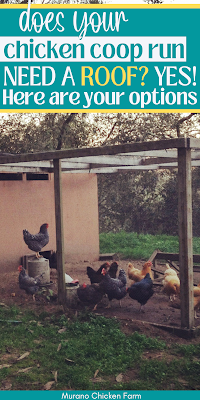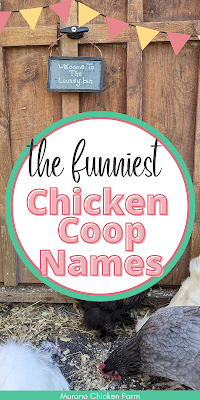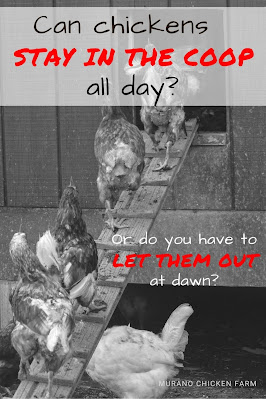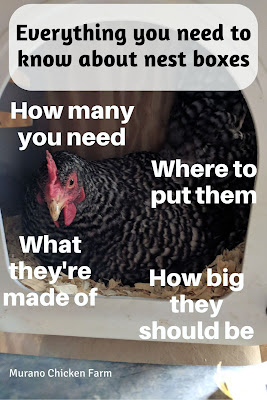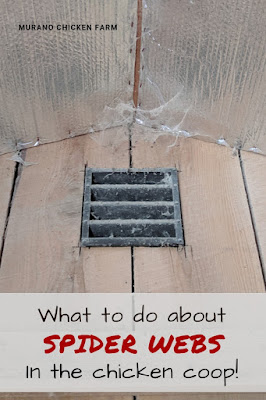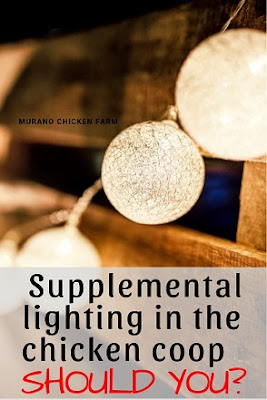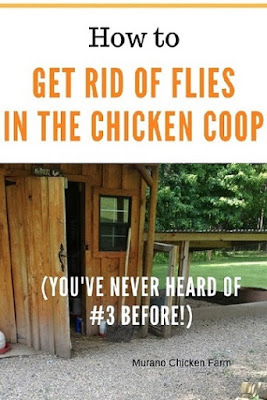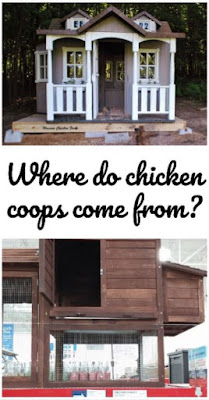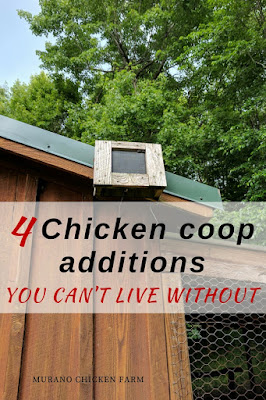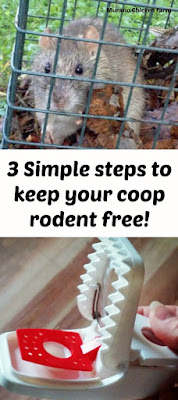Somebody recently asked me if their chicken run needed a roof and I realized I hadn't really talked about this very much. Today I want to talk about run roofs, if you need one and the different types of materials they can be made with.
All of my chicken runs have roofs of one type or another, even though one of them is only net. I firmly believe in protecting chickens as much as possible in their own coop and run, for both their safety and my sanity. So let's talk about the different types of run roofs.Household objects that work surprisingly well in chicken coops
A chicken coop doesn't need very much for the chickens to be happy. Some windows, a few nest boxes, perches and a place for their food & water and they will be perfectly content! However, adding some decorations or storage can make the coop more useable for you. Over the years I've repurposed a bunch of different household items to my chicken coops.
Many of them are for decoration like pictures, some are functional like lights but I also put several items in the coop for storage or organization. It's nice to be able to use previously unused space like wall space to store things and keep them within reach for when I'm tending the chickens!
It's also a good way to get a little bit more use out of things that might not be ready for the landfill just yet...
Funny chicken coop names
While looking for a chuckle-inducing name for 2 of my coops I've come across a LOT of comical coop name ideas so I decided to pass them on to you! From clever wordplay to witty references, these coop monikers will make your chickens cluck with laughter. Of course some of the more punny names can be a little ridiculous, but that's part of the fun!
Related reading: Funny Chicken Jokes.
How to clean a chicken coop
Today I had to clean out one of the chicken coops and it took me a little longer than I expected. I probably only do a deep cleaning about once a year, though I will dust down the spider webs and scoop up under the roosts more often. This was a serious cleaning today!
I use the deep litter method in my chicken coops, so it's really only a once a year clean out. Today was that day starting with the bedding and ending with a Shop-Vac. Here's the entire process.
Cooped up chickens. Do they have to come out?
Every chicken owner I know has had at least one day when they just couldn't let the chickens out for some reason. Life happens. Is it a problem if the chickens are in their coop all day? Or will something bad happen to them? Well, that answer depends on the coop.
I'm sure you've noticed that in bad weather your chickens choose to stay in their coop all day anyway. Of course making a choice and not giving an option are two different things completely, right? Especially if the feed or water are outside!
So the question is, is it safe to not let the chickens out? The answer is: if your coop has light, space and food/water then you're good to go.
Everything you need to know about nest boxes
Nest boxes also need to be up off the ground, but not too high and definitely not directly under a roost! Plus you need to have enough so hens can spread out.
Wow, that makes nest boxes sound so complicated! They're really not, in fact they're not even totally necessary. Chickens will lay their eggs on the floor in the corner if that is their only option. The problem though is that there's a lot of poop on the floor of a chicken coop, and it will end up on the eggs.
Spiders in the chicken coop
Why are spiders in the chicken coop?
Spiders really don't give a darn about your chickens! They want the bugs that are attracted by chicken poop and leftover food items. Not only do spiders eat the bugs flying around your chicken coop, but they are bugs. Chickens like bugs and yes, chickens will eat spiders. Spiders are smarter than we tend to think though and they will build their nests up out of the chickens reach. You'll rarely see a web right by a roost or near the feed. Spiders will build their webs right on lights or in front of ventilation holes. Pretty smart for them to catch the bugs where they're most likely to be.
Of course this means that when you walk into the chicken coop the webs are often hanging right in front of you which can be pretty unpleasant. So, should you knock down the spider webs in the chicken coop, or just leave them there?
I do a little bit of both.
Supplemental lighting in the chicken coop (should you?)
Lots of people talk about how they add lights to the chicken coop and "voila" egg production comes back! Does it really work that way though?
Well, yeah it sorta does. I had lights in my coop way back in the beginning when I first started raising chickens. I did this for 2 or 3 years before I quit. It really wasn't worth the hassle.
However, I jotted down some notes on my experience and I'm here to tell you everything I learned about lighting the chickens coop in winter.
Related reading: Tracking egg production in hens, free printable chart.
Can chickens get bed bugs?
As chicken keepers we understand that from predators to parasites, everything likes chicken! The best thing we can do for our chickens is to arm ourselves with the knowledge on how to deal with these issues. When I found out that chicken coops can be swarming with bed bugs, I needed to know exactly what I could do if this ever happened at my farm.
Keep flies out of chicken coop
The first step in reducing the fly population is to stop attracting them. They especially like fresh poop and wet feed. By cleaning up under the roost each morning and allowing my chickens to free range all day, the amount of fresh poop inside the coop is minimal.
When chicken feed, water and bedding mix they form a nasty smelling fermenting mass that flies seem to love. Leave it too long and you'll see maggots in it. Gross.
I use a pan under the water bowl for easy cleanup of spills, plus it keeps the floor from being wet all the time. Also remove any treats (like fruit) that the chickens haven't finished since rotting food is a favorite of flies.
Now that we've removed the things that attract the flies to the coop, here are the steps I use to keep them from returning.
Should I heat my chicken coop in winter?
I actually did put a heat source in my coop the first year I had chickens, but I've since learned that it's completely unnecessary and potentially dangerous. In fact, it's one of the most dangerous mistakes a chicken keeper can make!
We all worry about our chickens getting cold but if you think about it, lots of wild animals spend the winter outside and do perfectly fine.
One thing you might not know is that wild birds do not sleep in their nests. Nests are only for raising baby birds, the rest of the year they sleep in the trees.
They don't even have walls or a roof to protect them from the snow or cold and they do just fine.
The main reason I do not heat my coops is that heat lamps are notoriously unsafe! Every winter I hear of coops and barns that catch fire because of heat lamps.
Heat lamps are ridiculously hard to secure, even with the multiple zip ties and metal hooks I used to anchor it to pretty much anything nearby. Their clamps can slip off randomly which is never good!
Also, the chickens must be able to get close to a heat lamp for it to be effective, but being close to it means they could knock it down or fluff feathers or bedding up into it which can catch fire.
Plus heat bulbs burn out eventually and you might not be around or awake to change the bulb. The sudden drop in temperature can affect your chickens more than the natural cooling of the weather does.
Where do chicken coops come from?
Or maybe you have a chicken coop and flock but want to expand and aren't sure where to buy a new coop. Depending where you live, it can be hard to find chicken coops for sale!
Don't worry...as someone that has acquired 7 coop structures within a 8 years, I definitely have the answer for this one!
I'll start with the most obvious one. You build it. Most of us are familiar with the old fashioned chicken coops or even barns.
The great thing about building a chicken coop yourself is that you can make it as big or small as you like.
You can build a coop with one large room for one flock or separated inside to accommodate two flocks. You can add a brooder area or feed storage space.
You can design it however you want or pick one of the many available coop plans online to build. Modern Farmer has an easy to follow tutorial for building your own coop.
Obviously these are built from wood and on site, but if you don't have the skill or space to build your own coop you won't be able to go that route. So, other than DIY...
Where to buy chicken coops?
1) The hardware store. Many people have bought wood sheds from Lowes or home Depot to use as a chicken coop.Lowe's sent ours out with an assembly crew and we had a complete shed in just a few hours. All we had to do was clear the space ahead of time and put down a gravel base.
It came with the option of 2 extra windows or a skylight and big double doors. A couple roosts and some next boxes and it's done! We decided to paint the coop to match the house, but that wasn't necessary.
Does your chicken coop stink?
You can't stop the chickens from pooping, but you can control the chicken coop odor. I've found that simply opening up the doors and windows can air the coop out enough to remove most of the stink. A well ventilated coop will let in some fresh air even when closed up, which also lets out any bad odors that have accumulated.
Allowing the chickens free range time or access to a run can help in controlling the chicken coop poop smell. If they're pooping in the yard instead of the coop it cuts down the smell right at the source.
They do spend time in the coop at night though, and nobody wants a smelly chicken coop, especially if it's near your house! Here are:
6 things you can do to eliminate chicken coop odor
4 coop additions I can't live without!
Whether it be ease of cleaning, predator protection or a time convenience, every one of these 4 coop additions makes taking care of my chickens just a bit easier.
Now don't get me wrong, I like extras like sitting areas in the coop and window boxes but those aren't really things I need...these are!
Convert a playhouse into a cute chicken coop!
Isn't that the cutest playhouse turned chicken coop...ever?
When I was looking to get a coop for my silkies, I had some very definite ideas about what I wanted. I knew it had to be tall enough to walk in. I knew it had to be super cute and I knew I didn't want to do wood again.
We already did a wild west themed coop for our first coop so I didn't want a rustic look. Besides, wood coops are very difficult to keep clean.
In any coop, poop and dirt end up pretty much everywhere. Walls ceilings...nowhere is off limits. Because of this, I like to power wash my coops yearly. The wood is just a giant pain in the butt to dry out each time you do that.
I was looking for a plastic building to use as a chicken coop and I had looked at several different sheds and storage units when I came upon a kids playhouse on Craigslist. When we went to look at it, I just fell in love with it. I could absolutely see my silkie chickens living here!
It was a Victorian style playhouse with two bay windows, a set of double doors and two single doors. The playhouse had cute little porches on the front and back and window boxes for flowers. It had plexiglass windows, not just holes for windows like some smaller playhouses.
With all the doors it could be closed up completely making this the perfect playhouse to easily transform into a chicken coop!
Can I catch Histoplasmosis from chickens?
Yes it's all birds, not just chickens. However since keeping chickens entail things like cleaning the coop which stirs up chicken poop and bedding dust, you have a higher chance of catching histoplasmosis from your chickens then from random wild birds.
As you clean the coop you stir up these spores in the chicken poop and they become airborne, and you can then breathe them into your lungs.
Now before anybody panics, most people who contract histoplasmosis from chickens will have no or very few symptoms. In fact, many people that do contract histoplasmosis will think they have a mild cold or the flu.
Only about 10% of the people that contract histoplasmosis will develop serious eye or lung problems.
Related reading: Ocular Histoplasmosis, the bird droppings disease from Mother Earth news.
4 Ways to keep your chickens from sleeping in the nest boxes
Sleeping in the nest boxes is completely different than a broody setting on eggs in a nest box because a broody doesn't poop. A sleeping chicken does poop. Yes, I know that's weird but some things chickens do really are quite weird!
I have had to deal with this problem in the past and I have several different methods that usually work. The problem this time was the placement, mounting and type of nest box made it difficult to use any of those other methods in this situation.
I finally decided to put an end to this nest box sleeping thing and out of desperation I took all the nest boxes out of the coop! Now they have to sleep on the roosts, but that's just the beginning.
How to get rid of mice in the chicken coop
Normally they get caught before they can do too much damage because unlike squirrels and chipmunks, mice like to move in when they find a good food supply. I have a few different methods I use to catch them and it usually doesn't take long between when I find evidence of mice and when I get rid of them.
I did have one mouse that took a long time to catch though. When I finally got him I wasn't real sure if he was just a huge mouse or a small rat. (see picture) We decided he more than likely was a mouse but all that layer feed must have made him grow bigger then normal.
Whatever the reason was, I did not want to see one like him again!
How to get rid of mice in the chicken coop
Getting rid of rodents is a 3 step process. First you need to get rid of the reason they are there, next you need to get rid of them and finally you need to block their way back in.
Our first coop: the biggest mistake
Even the best laid plans go awry and even though the chicken coop looks great when it's done, the day comes when you look at it and say I really didn't think this through did I?
Whether the doors are too small, the roof is too low, you can't fit enough chickens, there's not enough light or there's too much ventilation (especially in a predators can get in sort of way) something went wrong. *sigh* I'm pretty sure we've all been there.
Coop building mistakes
The first coop we built was strategically set at the bottom of the yard. This was actually pretty well thought out believe it or not. It's a Wild West Saloon style coop my husband designed. It's right at the edge of the clearing and the chickens would be close to the house for carrying down feed and water but far enough away that hopefully they'd stay down in that direction and off the back porch.
We figured the trees would give some shade in the summer and a place for the chickens to play and dig to their heart's content. They also provide hiding spaces from predators that hunt from above, like hawks and eagles.
The water runoff from hard rain's tends to go smack dab through the middle of the yard which is a good 20 feet away from the coop so that wouldn't be a problem. Treated wood was bought for the platform base, and the guys went on and on about how it costs more but it'll last longer.
Amish hemlock was used for the rest of the chicken coop and I drove to the next county to pick up the special tin roofing.
The coop went up flawlessly and it was beautiful. The chickens moved in and everyone was happy. Everything appeared absolutely perfect. Then the rains came.What is a grow out pen. Do you need one?
Most of us are eager to get them into the coop, but if you already have a full grown established flock in there, it might not be such a good idea.
Full grown chickens could injure or kill the younger, smaller chickens. They could keep them from the feed or water or chase them out of the coop and not let them back in. Anything could happen really.
It's kinda like letting the grade school kids out to play with the high school class. You'd like for it to work and it usually does, but sometimes it goes bad real fast. So what are your options?
You could put them in the coop but separate them from the adults for awhile. Large dog crates work pretty well for this. Or you could put the chickens in a grow out pen instead.
A grow out pen is pretty much what the name implies: a fenced in coop and home for the chicks to grow up a bit before they move in with the adults.

